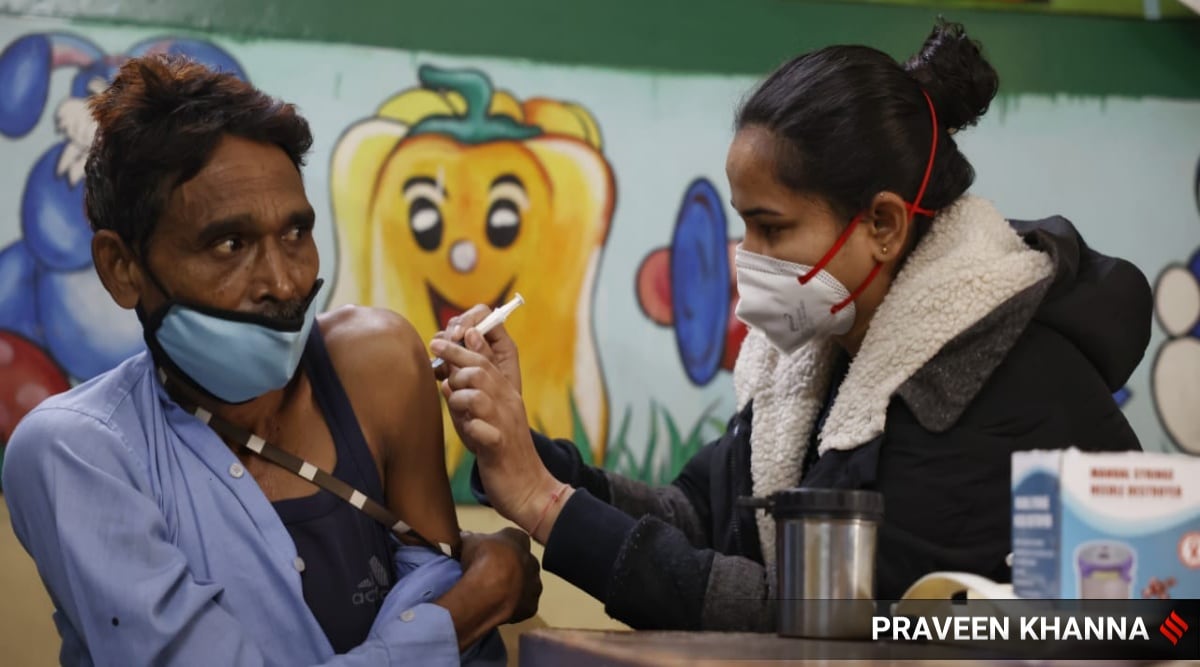 Covid-19 LIVE updates: A beneficiary receives a dose of the Covid-19 vaccine in New Delhi.
Covid-19 LIVE updates: A beneficiary receives a dose of the Covid-19 vaccine in New Delhi. Coronavirus Omicron India LIVE News: India reported more than 3.17 lakh (3,17,532) new Covid-19 cases in the last 24 hours ending at 9 am on Thursday, marking a 12 per cent increase in fresh cases since Wednesday. The country’s active caseload currently stands at 19,24,051, while the recovery rate stands at 93.69 per cent.
The total tally of Omicron cases rose to 9,287 on Thursday, 3.63 per cent higher than yesterday. As many as 491 Covid patients succumbed to the deadly infection in a day.
Here are some major Covid updates: The Covid test positivity rate has surged to 37 per cent in Kerala, as the Omicron-fuelled third wave continues to surge across the coastal state. “Next three weeks would be critical for Kerala,” said state health minister Veena George. Meanwhile, Data show a sharp gender gap in vaccination, particularly in the country’s top metros. India has clocked over 158 crore vaccines – first, second and precaution doses taken together — until January 18, at a ratio of 954 women for every 1,000 men. In other news, a new study shows that an infection with the Omicron variant of the Covid virus may not generate broad immunity in unvaccinated individuals that can protect against other variants.
 Vaccination status of passengers being checked onboard a public bus in Pune.
Vaccination status of passengers being checked onboard a public bus in Pune.

More than 158.96 crore vaccine doses have been provided to states and UTs so far, according to data released by the Union Ministry of Health and Family Welfare. Of these, over 12.72 crore doses are still available.
India reported more than 3.17 lakh (3,17,532) new coronavirus cases on Wednesday, marking a 12 per cent increase in fresh cases since yesterday. The active caseload currently stands at 19,24,051, while the recovery rate is currently at 93.69 per cent.
Hundreds of thousands of deaths occur today due to previously treatable infections — such as lower respiratory and bloodstream infections — because the bacteria that cause them have become resistant to treatment. A comprehensive estimate of the global impact of antimicrobial resistance (AMR), covering 204 countries and territories and published in The Lancet, has found that 1.27 million people died in 2019 as a direct result of AMR, which is now a leading cause of death worldwide, higher than HIV/AIDS or malaria.
The analysis
The Global Research on Antimicrobial Resistance (GRAM) report used statistical modelling to estimate deaths linked to 23 pathogens and 88 pathogen-drug combinations.
Apart from 12.7 lakh deaths caused directly by AMR (these would not have occurred had the infections been drug-susceptible), another 49.5 lakh deaths were associated with AMR (a drug-resistant infection was implicated, but resistance itself may or may not have been the direct cause of death). HIV/AIDS and malaria were estimated to have caused 8.6 lakh and 6.4 lakh deaths respectively in 2019. Read more.
In what could further underline the importance of vaccination, a new study shows that an infection with the Omicron variant of the Covid virus may not generate broad immunity in unvaccinated individuals that can protect against other variants.
However, the pre-print study from the US shows that in vaccinated individuals, an Omicron infection can boost existing immunity, thereby allowing the individual to fight off another infection better.
The study has been conducted by a team comprising Nobel Laureate Jennifer Doudna, researchers from the University of California, San Francisco; University of California, Berkeley; California Department of Public Health; and Covid-19testing start-up Curative Inc. Read more.
India has clocked over 158 crore vaccines – first, second and precaution doses taken together — until January 18, at a ratio of 954 women for every 1,000 men. Overall, this is higher than the sex ratio (933) as per the last Census but it’s the top metros that show a gender gap in vaccination.
Until January 18, Mumbai saw 1.10 crore men getting vaccinated against 76.98 lakh women, a ratio of 694 women for every 1,000 men. This is sharply lower than the city’s Census sex ratio of 832.
Similar is the disparity in Delhi: 1.64 crore men got vaccinated compared to 1.22 crore among women over the last one year — a ratio of 742 women every 1,000 men. As per the last Census, the sex ratio in Delhi is 868. Read more.